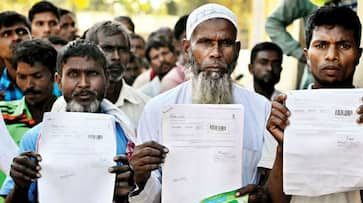The Citizenship Amendment Bill has driven a wedge in Assamese society where residents of Barak Valley, dominated by Bengalis, have welcomed the move; whereas the inhabitants of Brahmaputra Valley who are mostly Assamese, do not want non-Assamese people to be accommodated in the National Register of Citizens of India
New Delhi: If the narrative in a section of the media is to be believed, the Citizenship Amendment Bill has driven a wedge in Assamese society where residents of Barak Valley, dominated by Bengalis, have welcomed the move; whereas the inhabitants of Brahmaputra Valley who are mostly Assamese, do not want non-Assamese people to be accommodated in the National Register of Citizens of India.
The premise of the Bill is that non-Muslims are persecuted in Islamic countries surrounding India. These Hindus, Sikhs, Christians, Buddhists, Jains, Parsis, etc flee countries like Afghanistan, Pakistan and Bangladesh and seek shelter in this country. On the other hand, Muslims are not expected to suffer persecution in nations formed on the basis of their religion. Ergo, the proposed law posts, if they enter India, the motive has to be the lookout for greener pastures.
In simpler words, their reason is a lookout for employment, which is economic. And this is a burden on the already stressed economy of India, which nationalists are not ready to bear with. The Bill, however, tries to stay somewhat politically correct by referring to Muslim infiltrators as "economic migrants". The salient features of the law the Narendra Modi government proposes follow.
What is the Citizenship Amendment Bill?
- The Bill was introduced in the Lok Sabha on July 15, 2016.
- It seeks to amend the Citizenship Act, 1955 to provide citizenship to illegal migrants, from Afghanistan, Bangladesh and Pakistan, who are of Hindu, Sikh, Buddhist, Jain, Parsi or Christian extraction.
- It also seeks to reduce the requirement of 11 years of continuous stay in the country to six years to obtain citizenship by naturalisation.
- According to the Citizenship Act, 1955, an illegal immigrant is one who enters India without a valid passport or with forged documents, or, a person who stays beyond the visa permit.
- The Citizenship Act, 1995 prescribes five ways of acquiring Indian citizenship: birth, descent, registration, naturalisation and incorporation of the territory.
The Act above is related to the National Register of Citizens for Assam as the Bill seeks to alter a part of the register. Whereas the NRC wouldn't accommodate any citizen who lacks the bona fides, the Bill would make an exception for those who are not Muslim.
Also read: Hasina's advisor claims PM Modi assured Bangladesh NRC-excluded people won't be deported
What is the National Register of Citizens (NRC) of Assam?
- The NRC is the list of Indian citizens of Assam.
- The purpose of NRC update is to identify illegal migrants residing in Northeastern states who entered Indian territories after midnight on 24 March 1971, and to determine the citizenship of the applicants who have applied for inclusion of their names in the updated NRC.
- For a person’s name to be in the updated list of the NRC, they would have to provide proof of their existence of name in the legacy data or prove relation with someone whose name appears in the legacy data (collective list of the NRC data of 1951 and the electoral rolls up to midnight of 24 March 1971).
- The Centre has given an extension of six months to complete the ongoing exercise for updating the NRC in Assam by June 30.
- In a notification, the Registrar General of India said the decision has been taken as the exercise to enumerate citizens in the NRC, a list of Assam's residents, could not be completed within the specified date of December 31, 2018.
- On December 6, 2013, the government had issued the first notification setting a deadline of three years for completion of the entire NRC process. However, since then, five extensions were given by the government in regular intervals as the exercise has not yet been completed.
- The draft NRC was published on July 30 and included the names of 2.9 crore people out of the total 3.29 crore applications. There has been a huge controversy over the exclusion of 40 lakh people from the draft NRC.
- When the NRC was first prepared in Assam way back in 1951, the state had 80 lakh citizens.
- According to the 2011 census, Assam's total population is over 3.11 crore. The process of identification of illegal immigrants in the state has been widely debated and become a contentious issue in state politics.
Also read - PM Modi: Updated NRC will have 'genuine citizens'; Bill to get Parliament nod soon
The threat to national security by infiltrators and settlers like Bangladeshis and Rohingyas is perhaps greater than the burden on the economy. The Citizenship (Amendment) Bill stops short of mentioning terrorism, though. The people of the country must now decide whether the BJP-led NDA government is being harsh on Muslim infiltrators or going soft on terrorism by shying away from mentioning this as the most urgent situation, not to speak of the other law-and-order issues created by the illegal immigrants, that necessitated the Bill.
With inputs from Surajit Dasgupta
Last Updated Jan 5, 2019, 6:10 PM IST









![Salman Khan sets stage on fire for Anant Ambani, Radhika Merchant pre-wedding festivities [WATCH] ATG](https://static-gi.asianetnews.com/images/01hr1hh8y86gvb4kbqgnyhc0w0/whatsapp-image-2024-03-03-at-12-24-37-pm_100x60xt.jpg)
![Pregnant Deepika Padukone dances with Ranveer Singh at Anant Ambani, Radhika Merchant pre-wedding bash [WATCH] ATG](https://static-gi.asianetnews.com/images/01hr1ffyd3nzqzgm6ba0k87vr8/whatsapp-image-2024-03-03-at-11-45-35-am_100x60xt.jpg)


